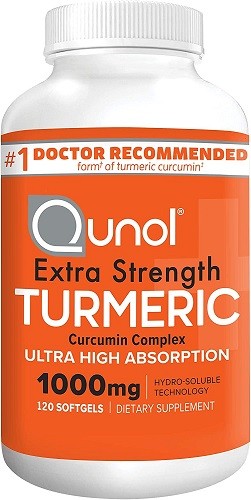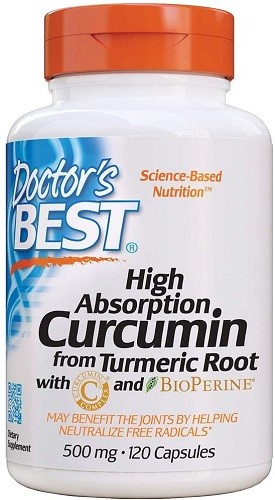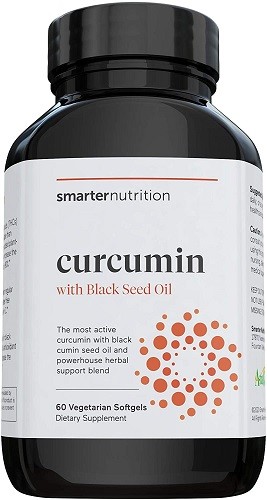Curcumin vs Turmeric – What’s the Difference?
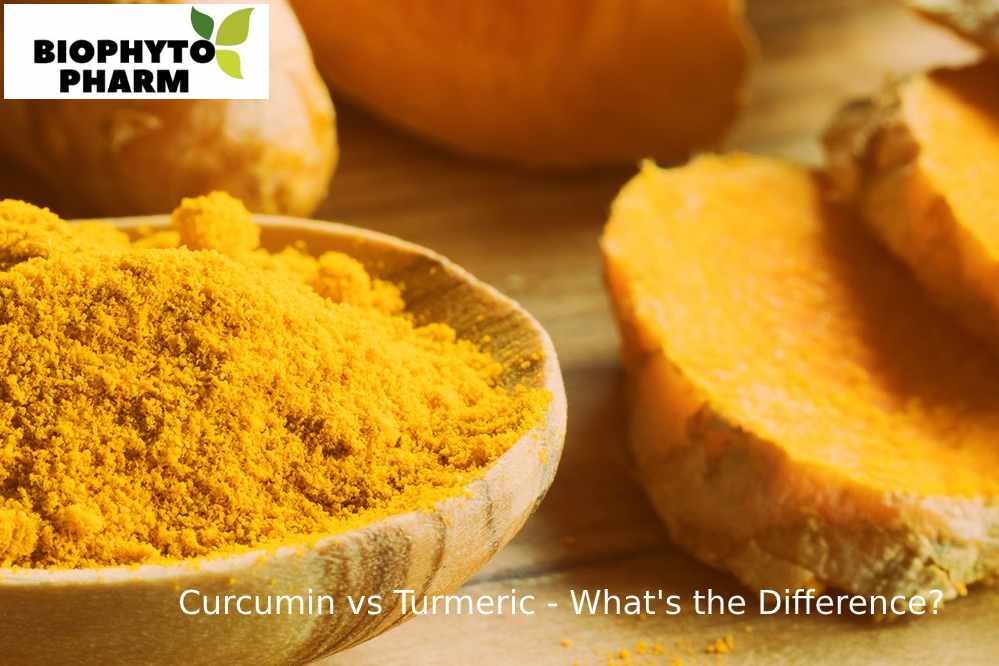
Turmeric is a type of spice that is widely used throughout Asia and is a major ingredient in curries. Turmeric vs curcumin is an important issue to discuss. Because of its yellow color, it is sometimes referred to as Indian saffron. Moreover, its extensive use in traditional medicine has sparked great interest in Turmeric health benefits.
If you’re a health nut on Instagram, you’ve probably seen your friends posting about turmeric or curcumin supplements. But what makes them so special? Are there any side effects? Are these supplements worth it? Read on to discover all about turmeric, and curcumin, and how they can make a difference in your life!
Why do people take turmeric and curcumin supplements?
Turmeric comes from the root of the Curcuma longa plant and is a common spice in Indian cooking. Turmeric contains a chemical called curcumin that has been studied for its potential health benefits. Curcumin may help treat or prevent a variety of health conditions, including cancer, heart disease, arthritis, and Alzheimer’s disease.
There are two types of curcumin: an auto-carcinogen and a DNA-protective IVC compound. Auto-carcinogens are absorbed into your body easily, while IVC compounds are far more complex and must be broken down by your liver before being absorbed. Studies show that curcumin — even at low doses — can help lower the risk of cancer through actions on the tumor suppressor PSMA-activated oncogene (Oncogene).
In 2011, a study investigated whether taking curcumin supplements (100 mg twice a day) could slow the rate of stomach cancer. They found that those who took curcumin supplements experienced a significantly lower rate of stomach cancers than those who didn’t.
Despite these promising findings, curcumin isn’t always safe to take with other medications. Some people are allergic to curcumin, and this can worsen their health problems and require additional medication to manage it.
To avoid that, curcumin is often recommended to your doctor or a healthcare provider before starting any new medications.
Curcumin is an enzyme supplement that works best when taken 10–12 hours before meals. The peak concentration is achieved at about 2–3 hours after consuming foods containing dietary fiber. Curcumin has been studied for its potential cancer treatments and also shows promise in reducing signs of aging, such as wrinkles and sagging skin.
Like other plants with vitamin C in them, you can make your regular cranberry juice or use a supplement. If you’re not a fan of cranberries, you can also buy preparations for the stuff at the grocery store. You’ll find it in juices, shampoos, and even toothpaste. Cranberries are packed with antioxidants that make them particularly good anti-inflammatory food.
How do turmeric and curcumin work in the body?
The active ingredient in turmeric, curcumin, is responsible for the anti-inflammatory and antioxidant effects that have been linked to protecting and healing the body. Curcumin is a powerful antioxidant that protects cells from free radicals (unstable molecules that cause cell damage) and has been shown to reduce oxidative stress-related damage. In addition, researchers have also linked curcumin to numerous other health benefits, including reducing the risk of diabetes, and liver disease, and improving brain function and cognitive abilities, all without affecting a person’s ability to eat.
It’s common to see studies showing that drinking a cup or two of black tea or coffee every day can reduce your cancer risks, as well as show promise for lowering blood sugar levels and improving overall mental health.
Curcumin also shows promise for protecting your eyesight and your ability to think clearly. Plus, it’s generally well-tolerated, and you don’t have to drink a lot of it to see the powerful health benefits.
Curcumin and turmeric have gained popularity in recent years as dietary supplements. However, like any dietary supplement, it’s important to know the quality of the supplement you’re taking and how much you should be consuming to get the most benefit. Fortunately, not all supplements contain curcumin, and it’s easy to determine if one is likely to be effective. For example, curcumin supplements of any kind should come with a clear list of ingredients and a pharmacist-approved “milk” or non-GMO container. In addition, it’s important to read the directions on the supplement box carefully to make sure you’ll get all the doses you need.
Most curcumin supplements available today are food-based. This means they contain active curcumin alongside sugar (either white sugar or brown sugar) to make the supplement more shelf-stable.
How much is enough? The 2020 Dietary Guidelines for Americans recommend getting about 1/4 to 1/3 cups of curcumin per day. Most curcumin supplements you see in the U.S.
How much should you take to get the most of these supplements?
For skincare supplements, most experts recommend taking between 250 and 500mg of active ingredients per day. For anti-aging supplements, most experts recommend taking between 500 and 1,000mg. Turmeric is a root that is commonly used in Asian cuisines, although it can also be consumed whole.
It has been associated with various health benefits, including the improvement of digestion, cardiovascular health, cancer prevention, and autoimmune disease. It’s also used as an ingredient in traditional Chinese medicine where it has been shown to stimulate wound healing. Please don’t confuse turmeric with ginger found in the same region.
WHY Turmeric SUPPLEMENTS MATTER
If you’re looking for a quick fix to boost your health, supplements might not be the best thing for you. However, if you consume foods that contain turmeric, for example, it can be a probiotic in your gut and help balance your gut flora. Curcumin can be used as an antioxidant, and the multiple benefits of curcumin alone make it worth the expense. It’s also been shown to scavenge free radicals from the body and may play a small role in reducing the burden of certain diseases such as cancer.
Because of the unique blend of phytochemicals present in turmeric, taking supplementation isn’t necessary for everything. Turmeric is generally safe to consume daily as an addition to green tea, a few tablespoons of ginger or miso soup, or in a latte.
Turmeric is non-toxic — it’s just the substance found in the root that is, which means it can be in your system when you don’t mean on consuming it. Still, there aren’t any harmful effects to consuming turmeric if you haven’t got a severe food allergy or sensitivity.
Read More: Turmeric for Boils- A Time-Tested Formula
What are the potential side effects of taking turmeric or curcumin?
Turmeric is generally considered safe when used in food amounts, but there are limited studies on its safety when taken by mouth in medicinal amounts. The side effects of turmeric include nausea, diarrhea, headache, and stomach upset. The NIH says that people who are taking blood-thinning medications should avoid taking turmeric.
Curcumin supplements also called “curcuminoids,” are often marketed as safer alternatives if you are looking to avoid turmeric’s side effects. According to Harvard Health, curcumin supplements can help relieve inflammation, blood clotting, diabetes, and heart disease. They can also alter the chemistry of your microbiome — the bacteria, viruses, and parasites that live in your body.
Administering a curcumin supplement on an empty stomach can often improve the absorption of nutritional nutrients. However, if you take curcumin supplements while you are already taking something containing turmeric, it can make it harder to absorb the supplements and may increase the risk of stomach upset.
Have you seen all those people who quit the unhealthy smoking habit or have completely cut their alcohol consumption? They’re seeing benefits from their actions. There’s a reason why these celebrities are embracing a plant-based lifestyle.
Healthline states that turmeric can stimulate the production of molecules that combat inflammation, which is the body’s natural defense against sickness and injury. When people consume curcumin, it can increase the levels of two molecules in the bloodstream that fight inflammation. These molecules are called interleukin-6 (IL-6). When persons consume curcumin, it can also increase the production of a chemical called adiponectin — both of these are good for reducing inflammation.
You may have also heard about aids and medications called “carcinogens,” which classify them as substances that can cause cancerous cells. Back in 1959, the International Agency for Research on Cancer classified turmeric as a carcinogen, along with many other food items, due to its powerful anti-inflammatory properties. Despite what people may think, there are not many studies done on the use of curcumin supplements. Some people that claim to be cancer-free can use curcumin supplements and claim they’re “ curing” their illnesses.
Are there any interactions with other drugs or supplements that you need to be aware of?
Some supplements can interact with other drugs or supplements, so be sure to do your research before taking any new supplement. For example, if you take a supplement that has a sedative effect (like melatonin), it could potentially interact with any medications that you’re taking that also have a sedative effect (like a sleep aid).
That said, it’s still a pretty safe compound to take. Most studies investigating curcumin showed it’s a safe supplement, although some reports suggest it can cause liver toxicity if taken in high doses.
Turmeric vs Curcumin
This article looks at the main benefits and differences between turmeric and curcumin, how to supplement them, and turmeric vs Curcumin.
What are Turmeric and Curcumin
Turmeric comes from the long root of turmeric, which is a flowering plant from the ginger family.
It is often sold in spice packages.
In India, turmeric is used to treat skin conditions, digestive problems, and aches and pains. It is a staple of Ayurvedic medicine, and it is a form of traditional therapy.
three notable types of curcumin are curcumin, dimethoxy curcumin, and bisdemethoxycurcumin. Among these, curcumin is the most active and the most beneficial to health.
And one of turmeric vs curcumin is that curcumin, which accounts for about 2-8% of most turmeric preparations, gives turmeric its distinctive color and flavor.
Curcumin is known by itself for its anti-inflammatory, anti-tumor, and oxidative effects.
Summary of turmeric vs curcumin is turmeric is used to treat many health problems, such as skin and digestive problems.
Turmeric Curcumin with BioPerine & Ginger 95% Curcuminoids 1950mg
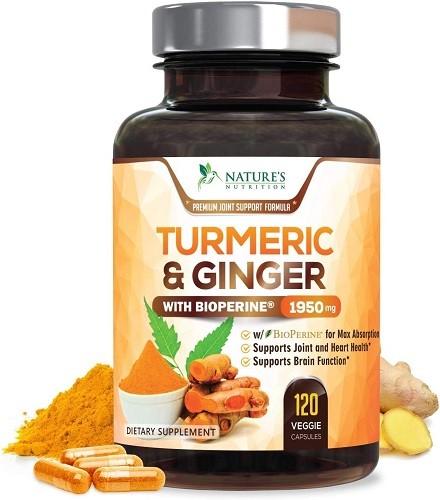
- Turmeric Curcumin with BioPerine and Ginger: Our excellent T3 Turmeric Curcumin Complex 1950mg; with normalized 95% Curcuminoids and 15mg BioPerine (Black Pepper) for better assimilation
- Quality Ingredients: Turmeric with Ginger is 1 of the most impressive spices on earth; Curcumin explicitly is 1 of the essential mixes in turmeric powder; and has been accounted to be 1 of the most beneficial spices; Turmeric Curcumin is a supplement-rich force to be reckoned with
They Have Many Common Benefits
Turmeric and curcumin both contain medicinal properties that provide several health benefits.
Here are some of the fields where turmeric and curcumin have shown clear benefits and how turmeric vs curcumin is seen, which is backed by science:
- In the spine: the plant compounds in turmeric that contain curcumin can reduce inflammatory markers and thus relieve arthritis symptoms.
- Obesity: Turmeric and curcumin may block the inflammatory pathway involved in obesity and may help regulate body fats.
- Heart disease: Turmeric and curcumin can lower harmful LDL cholesterol and triglycerides and reduce the risk of heart disease as a result.
- Diabetes: Turmeric and curcumin can improve blood sugar metabolism and may reduce the effects of diabetes on your body.
- Cancer: Although the research is still in its early stages, turmeric and curcumin may reduce the activity of the colon and other cancer cells.
- Anti-fungal: Turmeric and curcumin can disrupt fungal cell membranes and can be used with fungal medications to achieve better results.
- Antibacterial: Turmeric and curcumin have powerful antibacterial effects. It can prevent the growth of many diseases.
In summary both turmeric and curcumin contain medicinal and antimicrobial properties. Studies show that turmeric vs curcumin is not a great thing.
For Turmeric vs Curcumin, Turmeric May Have Some Health Benefits not Attributed to Curcumin
- Not only is it good for arthritis, but it may also protect your mind as you age.
- Turmeric contains different plant compounds that work together to support your body.
- The study also showed that the Kurdion in turmeric had the best inhibitory effect. However, when combined with the other seven ingredients, the inhibition of fungal growth was stronger.
Likewise, another study found that turmeric was better at suppressing cancer cell growth than curcumin alone.
However, since turmeric does contain curcumin, it is difficult to determine whether turmeric is better than curcumin when it comes to other health conditions, so it’s difficult to know exactly what turmeric vs curcumin is.
Lets us Return to the Basic Point ‘Turmeric vs Curcumin’
Turmeric is composed of plant compounds that have antioxidant, anti-inflammatory, and anti-microbial activities.
Curcumin may be more beneficial than turmeric in certain situations
Researchers have begun isolating it and examining whether it can benefit certain conditions since curcumin is considered to be the most active ingredient.
It has been shown to have powerful anti-inflammatory and antioxidant effects and may support wound healing through its antibacterial effects.
Furthermore, turmeric and curcumin have been found to reduce blood sugar in type 2 diabetes
Nature’s Bounty Turmeric Curcumin Caps
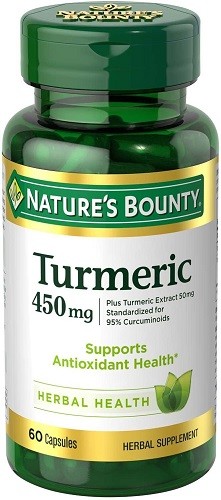
- Helps battle cell-harming free extremists in the body
- Curcumin is a carotenoid shade found in the rhizome of Turmeric
- Has a long history of utilization in India
- These assertions have not been assessed by the Food and Drug Administration
- Bundling may change due to updates, same incredible item fixings
- Throughout the mid-year months, items may show up warm however Amazon stores and ships items as per producers’ suggestions, when given.
Benefits of Soap of Turmeric vs Curcumin
The benefits of turmeric are not limited to its nutritional value and added to various food recipes, but it can be used to take care of the beauty of the skin and hair, discover the following more about the benefits of turmeric and turmeric for the skin and face, and turmeric recipes for the face to enhance …
Proven Health Benefits of Turmeric vs Curcumin
Turmeric may be the most effective dietary supplement in existence. Several serious studies show that it has major benefits for your body and brain.
The Main Evidence-Based Health Benefits of Turmeric
The benefits of turmeric soap for acne deeply cleanse the skin, purify it, and eliminates the bacteria that cause acne. Eliminate blackheads, fight acne, and treat acne, and its effects.
Benefits of Turmeric for The Skin
Turmeric is derived from curcumin. Turmeric protects the skin from cancer, by stopping the development of the tumor
The Main Ingredients of Turmeric Include:
- Oils such as cineole, termeron, and cimine.
- Curcuminoids such as curcumin
- Important body minerals such as potassium, manganese, copper, iron, zinc, and magnesium
- Vitamins B1, B2, C, E, and K.
- Soluble and insoluble dietary fiber
Turmeric is used for inflammatory disorders, including arthritis, tendinitis, and autoimmune diseases. Take daily 400-600 mg of turmeric 3 times. Look for standardized products with 95%
curcuminoids. focusing on turmeric vs curcumin has seen that neither curcumin nor turmeric taken by mouth is absorbed well unless taken with black pepper or piperine. If you want to make shopping for nutritional supplements, make sure that the one that you choose contains black pepper extract.
When you take turmeric supplements be patient, because the full benefits may not be apparent for eight weeks.
Researchers find that the root of turmeric helps in providing beneficial effects for those with disorders related to inflammation. Recent studies show that turmeric can reduce plaque buildup to prevent heart disease.
They found that both turmeric and curcumin may help to improve blood lipid levels.
Read More: cinnamon supplements benefits uses and side effects


